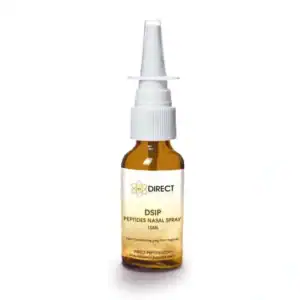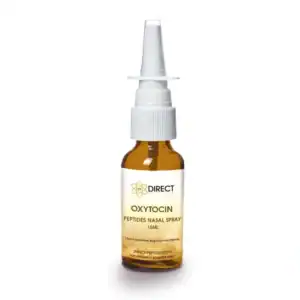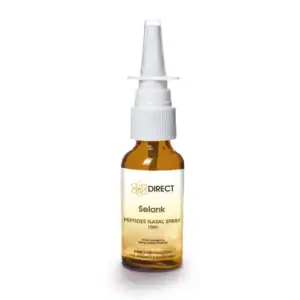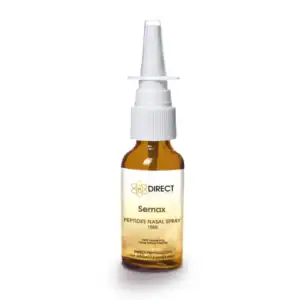Peptide therapy is a transformative area of research in modern medicine. It shows great potential for targeted treatments. Among these advancements, nasal sprays like Selank, Semax, Oxytocin, and DSIP stand out.
They are notable for their ease of use and delivering therapeutic effects efficiently. Dosages are often measured in mg/mL. These compounds are strictly for research purposes. Their applications remain under rigorous scientific investigation.
Peptides are short chains of amino acids. They act as messengers in the body. Peptides regulate various bodily functions such as metabolism, emotional balance, muscle growth, and tissue regeneration.
Each specific peptide interacts with specific receptors, allowing for targeted modulation of biochemical pathways to achieve desired therapeutic effects. Advances in peptide production have broadened their use in medical research significantly.
Selank, developed in Russia in the 1980s by Russian scientists, is a synthetic analogue of tuftsin. Tuftsin is a neurotrophic factor known for its role in modulating both the immune and nervous systems. This type of peptide is specifically designed to enhance emotional balance and improve cognition. Its nasal delivery method ensures fast absorption, allowing for efficient therapeutic effects.
Selank Nasal is a synthetic analog of Tuftsin, the body’s stress-reducing peptide. It is used to lower anxiety and PTSD symptoms. It also helps improve focus, mental clarity, and cognitive function. Selank Nasal may reduce symptoms of depression. It can improve overall mental well-being too.
Studies show Selank might help with diseases like Alzheimer’s and Parkinson’s. It improves neurotransmitter balance. This gives therapeutic effects. Selank helps in learning more about cognitive decline and how to fight it.
For more information, Visit Selank category page.
Semax is a synthetic analogue of adrenocorticotropic hormone (ACTH). It has been extensively researched for its effects on neurotrophic factors. These include brain-derived neurotrophic factor (BDNF) and NAD. This peptide supports cognitive health, attention, and neuroprotection. It is a promising tool in research on ADHD and cognitive disorders.
Applications of Semax
For more information, Visit Semax category page.
Oxytocin is called the “love hormone.” It helps with sexual function, social bonding, and emotional control. Researchers are studying oxytocin nasal sprays. These may ease social anxiety, improve resilience, and help people with PTSD. Oxytocin works by changing biochemical pathways. It helps manage stress and keeps emotions stable.
For more information, Visit Oxytocin category page.
 Delta Sleep-Inducing Peptide (DSIP) is a natural compound. It helps regulate sleep and endocrine function. Researchers are studying DSIP for its ability to address insomnia.
Delta Sleep-Inducing Peptide (DSIP) is a natural compound. It helps regulate sleep and endocrine function. Researchers are studying DSIP for its ability to address insomnia.
It may also help with hormonal imbalances and chronic stress-related conditions. Its unique action promotes emotional balance. DSIP also improves sleep quality.
For more information, Visit DSIP category page.
Peptides are experimental. Ethical handling and strict research protocols are essential. Researchers must obtain explicit consent. They must also consider individual patient characteristics.
This includes family history of medullary thyroid carcinoma (MTC), semaglutide-related family history of MTC, and tirzepatide-related endocrine neoplasia syndrome type 2. Proper medical consultation minimizes risks and ensures compliance with recent FDA regulations.
The rapid growth of peptide research needs ongoing support from regulatory bodies. It addresses challenges like the availability of certain substances. Regulatory adjustments ensure safe exploration of peptides. They also align with the latest updates in legal and ethical standards.
Advancements in peptide research may unlock new uses. These include personalized treatments for inflammation, metabolic disorders, headaches, nausea, and ADHD. But possible side effects should be noted, like mild irritation at the injection site.
The recommended frequency of use for peptide therapy can differ based on the treatment. Combining peptide therapy with other methods might improve results. This offers key benefits for complex conditions while following ethical rules.
Peptides like Selank, Semax, Oxytocin, and DSIP are new tools in medical research. They can affect cognitive, emotional, and physical processes. This makes them valuable for improving therapeutic science. These compounds are only for research use. It is important to follow safety and ethical rules strictly.
[1] Volkova A, Shadrina M, Kolomin T, Andreeva L, Limborska S, Myasoedov N, Slominsky P. Selank Administration Affects the Expression of Some Genes Involved in GABAergic Neurotransmission. Front Pharmacol. 2016 Feb 18;7:31.
[2] Medvedev VE, Tereshchenko ON, Israelian AIu, Chobanu IK, Kost NV, Sokolov OIu, Miasoedov NF. [A comparison of the anxiolytic effect and tolerability of selank and phenazepam in the treatment of anxiety disorders]. Zh Nevrol Psikhiatr Im S S Korsakova. 2014;114(7):17-22.
[3] Kolik LG, Nadorova AV, Antipova TA, Kruglov SV, Kudrin VS, Durnev AD. Selank, Peptide Analogue of Tuftsin, Protects Against Ethanol-Induced Memory Impairment by Regulating of BDNF Content in the Hippocampus and Prefrontal Cortex in Rats. Bull Exp Biol Med. 2019 Sep;167(5):641-644.
[4] Dolotov OV, Karpenko EA, Seredenina TS, Inozemtseva LS, Levitskaya NG, Zolotarev YA, Kamensky AA, Grivennikov IA, Engele J, Myasoedov NF. Semax, an analogue of adrenocorticotropin (4-10), binds specifically and increases levels of brain-derived neurotrophic factor protein in rat basal forebrain. J Neurochem. 2006 Apr;97 Suppl 1:82-6.
[5] Carter CS. Oxytocin and love: Myths, metaphors and mysteries. Compr Psychoneuroendocrinol. 2021 Dec 27;9:100107.
[6] Kovalzon VM, Strekalova TV. Delta sleep-inducing peptide (DSIP): a still unresolved riddle. J Neurochem. 2006 Apr;97(2):303-9.
Nasal Sprays are available Online from Direct Peptides Latvia. Peptide Nasals offer a convenient alternative to researching peptides without the use of injections.

Oxytocin Nasal Spray
£20.64 – £36.29Price range: £20.64 through £36.29 Select options This product has multiple variants. The options may be chosen on the product page
Selank Nasal Spray
£42.58 – £79.16Price range: £42.58 through £79.16 Select options This product has multiple variants. The options may be chosen on the product page
Semax Nasal Spray
£33.94 – £61.89Price range: £33.94 through £61.89 Select options This product has multiple variants. The options may be chosen on the product page
DSIP Nasal Spray
£26.24 – £47.48Price range: £26.24 through £47.48 Select options This product has multiple variants. The options may be chosen on the product pageALL CONTENT AND PRODUCT INFORMATION AVAILABLE ON THIS WEBSITE IS FOR EDUCATIONAL PURPOSES ONLY.
DISCLAIMER: These products are intended solely as a research chemical only. This classification allows for their use only for research development and laboratory studies. The information available on our Latvia Direct Peptides website: https://direct-peptides.com is provided for educational purposes only. These products are not for human or animal use or consumption in any manner. Handling of these products should be limited to suitably qualified professionals. They are not to be classified as a drug, food, cosmetic, or medicinal product and must not be mislabelled or used as such.